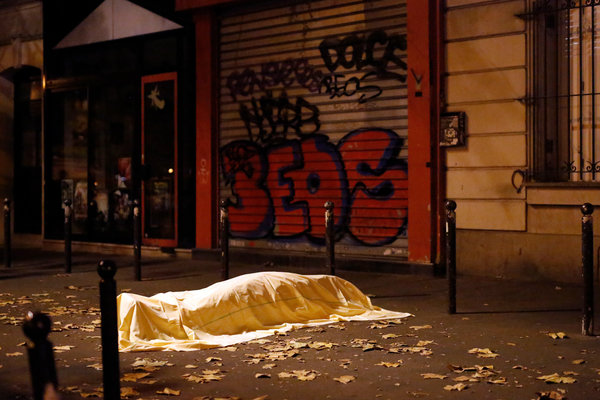Henry Miller wrote this in the early pages of Big Sur and the Oranges of Hieronymus Bosch: “The enchanting, and sometimes terrifying, thing is that the world can be so many things to so many different souls.”
While the rise of the Islamic State, a nightmarish quasi-nation of no precise borders, was certainly made possible by the senseless invasion of Iraq by the United States, I don’t think the destructive impulse that drives it was. Unfortunate geopolitical decisions liberated the madness but did not create it. Terror is usually thought to be a response, but it can also be a call, driven by deeply embedded ideologies and psychologies, whether we’re speaking of a large-scale operation like Nazism or a relatively small-scale one like ISIS. Sometimes evil is just evil.
Disappear every last Westerner from the Middle East and attacks such as the horror in Paris will continue, because the very fact of liberalism and secularism is incompatible with this small but destructive band of zealots. The world just means something different to them, and they can’t abide by such differences.
The overwhelming majority of the globe’s nearly 1.6 billion Muslims are clearly living peaceful, productive lives, but the members of ISIS and Al Qaeda aren’t among them. There’s no easy strategy to defeat them for good, with trillions of dollars of boots on the ground unlikely to bring about a lasting peace and likely to be attended by many casualties. A broader coalition of free nations acting in an opportunistic military fashion is really the best guess right now.
In his latest FT column, Edward Luce looks at the impact of the Paris attacks on the U.S. 2016 election season. An excerpt:
Even before the carnage in Paris, the sands of American public opinion were shifting. Last week a majority said they were prepared to put more US troops into Iraq and Syria to defeat Isis. After November 13, that number is likely to rise. The pressure on Mr Obama to take more drastic action, such as agreeing to “no-fly zones” within Syria, is rising. At nearly every point, Mr Obama has been caught behind the curve on Syria. In early 2014, he described Isis as “junior varsity”, which meant they were unlikely to trouble the grown-ups. Within weeks the group had taken control of up to a third of Iraq and was spreading rapidly in Syria. Whatever the reality on the ground today, Americans are prone to distrust Mr Obama’s reassuring words on Isis.
He is losing his grip on the language. When he came into office, Mr Obama quietly dropped George W Bush’s “war on terror”. That downgrade looks unlikely to outlast his period of office. It was motivated by the view that the US had brought much of the terror on itself by the mistaken 2003 invasion of Iraq, which Mr Obama vowed to undo. By 2011, all US troops were out of Iraq.
But the success of Isis, which filled much of the vacuum left by a departing US, has challenged Mr Obama’s worldview. Instead of seeing Isis as a product of the botched aftermath of the US invasion of Iraq — notably the decision to disband Saddam Hussein’s Sunni-dominated army and leave Baghdad in the grip of the Shia — many Americans see it as a result of Mr Obama’s decision to pull out of Iraq in 2011. He has already put 3,500 troops back into Iraq. US public opinion would like to see more. The Paris attacks will increase that drumbeat.
Mr Obama’s fellow Democrats have yet to catch up with that reality.•
Tags: Edward Luce

